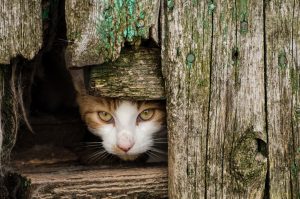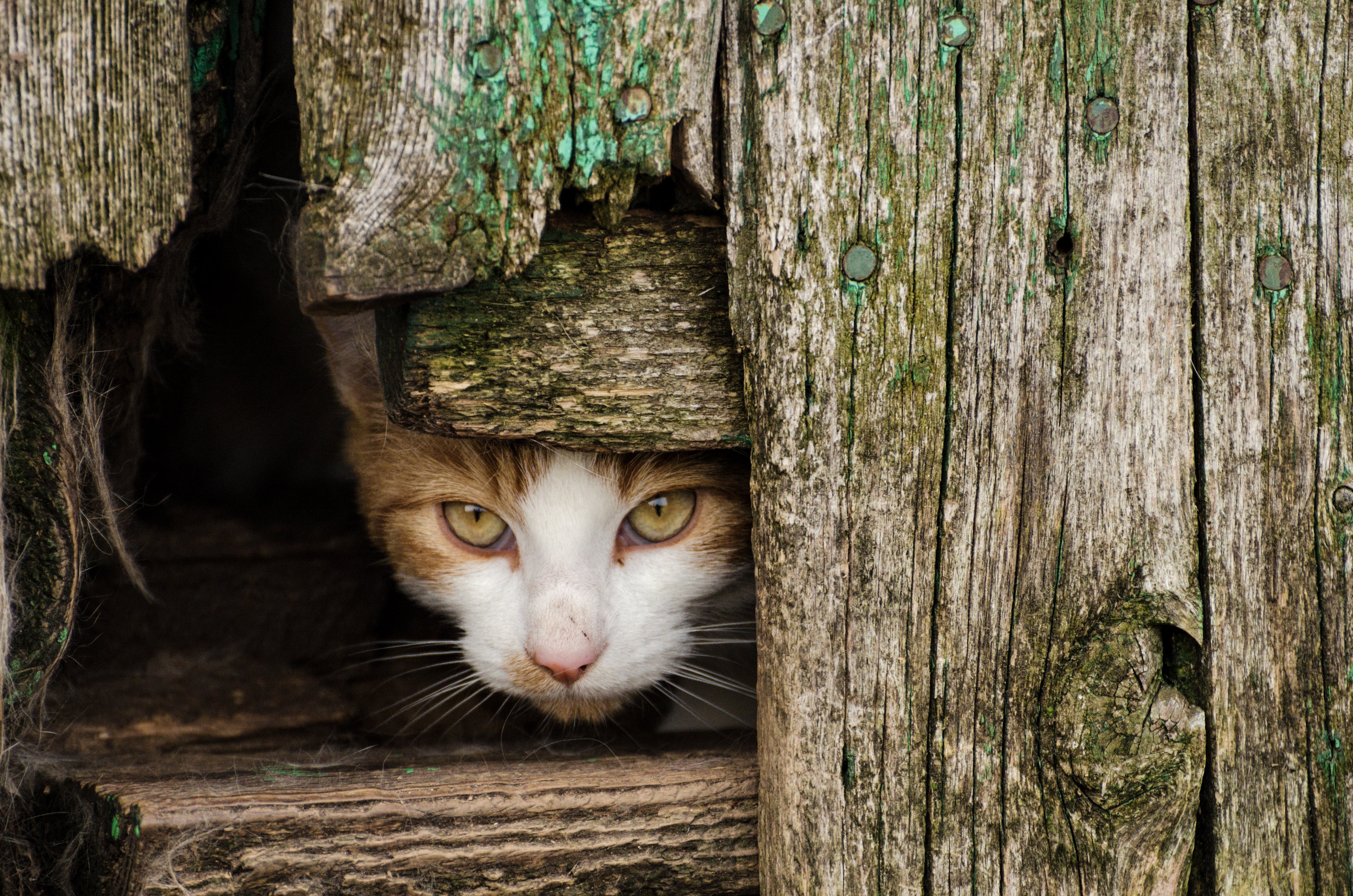Can You Make A Feral Cat A Pet?
Free Pet Insurance Comparison
Compare Quotes From Top Companies and Save
Secured with SHA-256 Encryption
Dr. Pippa Elliott BVMS, MRCVS
Veterinarian
Dr Pippa Elliott BVMS, MRCVS is a veterinarian with over 30 years of experience in companion animal practice. In 1987 she graduated from the University of Glasgow, with a degree in veterinary medicine and surgery. She works at Blythwood Vets and the People’s Dispensary for Sick Animals (PDSA). Pippa is an advocate of Fear-Free Practice, an animal addict, and a veterinary writer. She is also w...
Veterinarian
UPDATED: Dec 18, 2023
Pet Insurance U receives compensation from the third parties included on this site. This includes payment for clicks from our site to insurance providers’ sites and quote requests generated. Our rankings and reviews are not affected by payments from the insurance companies. The compensation we receive allows the site to be free and regularly updated. Our goal is to review every pet insurance provider, but not all companies are listed on the site.
And many of the companies we review do not pay us anything. We simply rate, compare and review their plan because we feel it will be valuable to you. Our reviews are guaranteed to be unbiased, professional and advertising compensation does not influence rankings.
We are a free online resource for anyone interested in learning more about pet insurance. Our goal is to be an objective, third-party resource for everything pet insurance related. We update our site regularly, and all content is reviewed by pet insurance experts.
UPDATED: Dec 18, 2023
Pet Insurance U receives compensation from the third parties included on this site. This includes payment for clicks from our site to insurance providers’ sites and quote requests generated. Our rankings and reviews are not affected by payments from the insurance companies. The compensation we receive allows the site to be free and regularly updated. Our goal is to review every pet insurance provider, but not all companies are listed on the site.
And many of the companies we review do not pay us anything. We simply rate, compare and review their plan because we feel it will be valuable to you. Our reviews are guaranteed to be unbiased, professional and advertising compensation does not influence rankings.
On This Page
All cats are special, but some tug on your heartstrings more than others. If there’s a scrawny, scaredy-cat that lives rough in your neighborhood, it’s difficult for any cat lover to walk past and not be moved.
In the winter, you put food out. The cat starts to recognize you and slinks out of hiding, trusting you enough to nibble the kibble. And the first time the feral cat rubs around your ankles in anticipation of a meal, there’s no way you don’t get a big lump in your throat.
At that point, you may consider catching the cat and giving him a home. This is a praiseworthy thing to do, but for both your sake and the cat’s, it’s important to be realistic about feral cats and the slim chances of them becoming pet-ified.
There are also a number of factors to consider before you commit to taking in a feral cat as a pet.
Things To Think About Before Bringing Home A Feral Cat
Do you have other cats?
This question is significant because even assuming a feral cat fits in (which is hugely unlikely), there is a risk of the feral cat carrying infections that could be transmitted to your pet.
Common Diseases Feral Cats Could Have Include:
- Feline leukemia virus (FeLV)
- Feline Immunodeficiency Virus (FIV)
- Infectious diarrheas such as giardia, campylobacter, or coronavirus
- Ringworm
- Worms
- Fleas, lice, and other external parasites
OK, so your best bet is to trap the feral cat and take them straight to the vet. Get a thorough check-up, including blood tests for FeLV and FIV, a worming shot, flea treatment – and spaying or neutering. Only if you get the all-clear from your vet should you consider introducing this guy into your existing fur-family.

Enter your ZIP code below to view companies that have cheap pet insurance rates.
Secured with SHA-256 Encryption
How To Win A Feral Cats Trust
Making friends with a feral cat is never guaranteed. It’s a good start if the cat trusted you enough to rub around your ankles, but this a far cry from becoming fully friendly. The trouble is feral cats lack a vital piece of their upbringing which makes them comfortable around people.
The missing puzzle piece is called “socialization,” and for a cat to confident with two-leggers the kitten must be handled daily from just after their eyes open at two weeks of age. If this doesn’t happen, by nine weeks old their young brain puts people in the “scary” box, and it’s incredibly hard (if not impossible) to get reassigned to the “friends” file.
When you think of a hissing, spitting, feral cat, it’s fear then makes them feisty – indeed, their ferociousness is a measure of their fear. Given time and patience, you can build bridges, but it takes months, if not years, and there’s no guarantee of success.
To win their trust you must think like a cat.
Top Tips To Win The Trust Of A Feral Cat:
- Move slowly and avoid sudden movements
- Speak quietly and calmly, never shout or argue near the cat
- Sit or lie on the floor (we tall two-leggers look gigantic and very scary to a cat)
- Try dangling a wing-on-a-string near the cat, inviting him to play but keeping your hands out of harm’s way
- Scatter treats around you, so the cat associates your presence with good things
- Provide regular meals, sit near the cat as he eats and talk soothingly
- Wait for the cat to come to you
- Never chase the cat, forcibly restrain him, or pick him up unless the cat is totally happy and relaxed
Given time, the feral cat may understand you are their caregiver and learn to trust. But you also have to accept that you now own a cat that hides each time you enter the room and lashes out when you try to stroke her.
Some Wild Cats Are Just Not Meant To Be Inside
It might be better all-round to consider a compromise. This could mean leaving the cat where he is, but providing a weatherproof shelter and a feeding station.
It’s also good to think of these animals not as feral cats but as community cats. If you can involve other people in feeding and caring for them, the cats will be covered when you’re on vacation. Give them just a little care and feral cats will reward the neighborhood by keeping the vermin population down.
And finally, if you do nothing else, get the cat fixed as part of a trap-neuter-return (TNR) scheme. This will prevent this cat having kittens and perpetuating the feral cat population.
For more information on cats check out our blog.
Other articles you may find helpful:
Is Exotic Pet Insurance Necessary?
The Best Pet Insurance By State
Fun Facts, Dog FAQ, And Unsolicited Dog Advice
5 Training Commands to Save Your Dog’s Life
The Ultimate Guide to Safe Foods for Dogs
We have worked hard to provide you with all the free resources possible to help give you insight into the best pet insurance for cats, additional cat breeds info, common cat health issues, and a fun look at frequently asked cat questions.
Other Frequently asked cat questions and some unsolicited catty advice…
Why your cat ignores you when you call it?
How to stop your cat from scratching the carpet?
Can you make a feral cat a pet?
Why does my cat pee outside the litter box?
Why do people walk their cats on a leash?
4 Ways to prepare for a new kitten
10 hidden hazards for indoor cats
Why changing your cat’s food is risky

Frequently Asked Questions
Can I make a feral cat a pet?
While it’s possible, it’s essential to be realistic about feral cats. Socializing them can be challenging, and success is not guaranteed. Consider factors like existing pets, potential health issues, and the cat’s temperament before making a decision.
What should I consider before bringing home a feral cat?
Before bringing a feral cat home, consider factors like existing pets, potential health issues, and the cat’s temperament. It’s crucial to have the cat examined by a vet, including tests for diseases like FeLV and FIV, vaccinations, and spaying or neutering.
How can I win a feral cat’s trust?
Gaining a feral cat’s trust takes time and patience. Understanding their behavior and thinking like a cat is key. Building trust involves gradual interactions, respecting their space, and providing care. However, success is not guaranteed, and some feral cats may prefer an outdoor lifestyle.
Are there diseases that feral cats could carry?
Yes, feral cats may carry diseases like FeLV, FIV, worms, and fleas. It’s crucial to have a feral cat thoroughly examined by a vet before introducing them to existing pets. A vet can provide necessary vaccinations, treatments, and spaying/neutering to ensure the cat’s health.
Should I consider leaving a feral cat outdoors?
In some cases, providing a weatherproof shelter and a feeding station while leaving the cat outdoors may be a compromise. Community involvement in caring for these cats, along with trap-neuter-return (TNR) programs, can help control the feral cat population. Is it necessary to involve other people in caring for feral cats?
Is it necessary to involve other people in caring for feral cats?
Involving others in caring for feral cats, creating a community effort, ensures consistent care, especially when you’re unavailable. Additionally, participating in trap-neuter-return (TNR) programs helps control the feral cat population by preventing them from reproducing.
How can I contribute to controlling the feral cat population?
Consider participating in trap-neuter-return (TNR) programs to prevent feral cats from reproducing. This helps control the population and contributes to the well-being of these community cats. Is it possible to fully socialize a feral cat?
Is it possible to fully socialize a feral cat?
Fully socializing a feral cat is challenging, and success is not guaranteed. Feral cats lack essential socialization early in life, making it difficult for them to become fully comfortable around humans. It requires time, patience, and understanding of their behavior.
What are the common diseases feral cats could have?
Feral cats may carry diseases such as FeLV, FIV, worms, and fleas. It’s crucial to have them thoroughly examined by a vet, including blood tests and necessary treatments, before considering them as pets.
How can I provide for a feral cat without making it a pet?
If making a feral cat a pet is not feasible, consider providing a weatherproof shelter and a feeding station. Treating them as community cats and involving others in their care can contribute to their well-being without the need for domestication.
Enter your ZIP code below to view companies that have cheap pet insurance rates.
Secured with SHA-256 Encryption
Dr. Pippa Elliott BVMS, MRCVS
Veterinarian
Dr Pippa Elliott BVMS, MRCVS is a veterinarian with over 30 years of experience in companion animal practice. In 1987 she graduated from the University of Glasgow, with a degree in veterinary medicine and surgery. She works at Blythwood Vets and the People’s Dispensary for Sick Animals (PDSA). Pippa is an advocate of Fear-Free Practice, an animal addict, and a veterinary writer. She is also w...
Veterinarian
We are a free online resource for anyone interested in learning more about pet insurance. Our goal is to be an objective, third-party resource for everything pet insurance related. We update our site regularly, and all content is reviewed by pet insurance experts.


